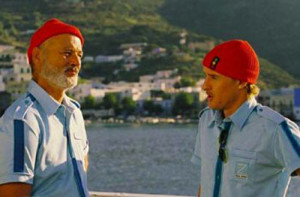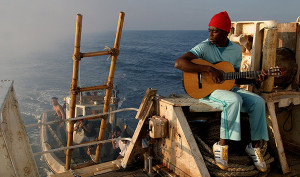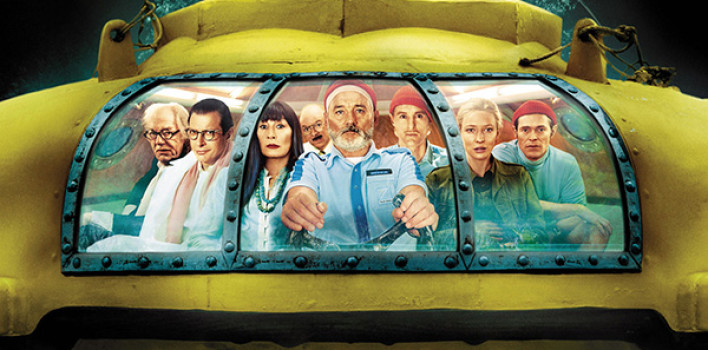Director’s Cut| Wes Anderson’s ‘The Life Aquatic with Steve Zissou’
If you’re reading this, it’s likely you don’t have to think to hard when asked what your favorite movie is. Some have to give a list of three or five because they aren’t able to choose between them, like being asked which one of their children they love most. I fall into the other category, being able to give a very quick response of one movie. The Life Aquatic with Steve Zissou.
The Life Aquatic (LA) begins and ends with the same scene, Steve Zissou (Bill Murray) in classical theater, showing his newest film to thousands of rich snobs. The outcome of both scenes is very similar and yet, at the same, time very different. The opening film shows him losing his closest friend and right hand man, Esteban, to a creature Steve is only able to catch a glimpse of. At the showing he is mocked and ridiculed by most of the patrons at the event. The aquatic research community scoffs at the idea that he has found an odd new species that he has dubbed the jaguar shark and that this shark just happens to have killed his friend. This event goes on to set the entire course of the film. The team of the Belefonte, Zissou’s ship, leave the showing and almost immediately set off to find this creature again.
The funding comes by way of Ned Plimpton (Owen Wilson). Ned meets Steve at a party after the first film screening and tells him of his long time of love of Team Zissou’s adventures. He goes on to explain his connection to Steve through one of his past lovers, Ned’s mom. He was told that Steve was his father, and almost immediately is asked to join the crew. Steve offers to help him get his name changed to what he would’ve named him, Kingsley Zissou. It’s moments like these where I think we all both cringe and chuckle.
Much of middle action of this film is slice of life storytelling. We see moments of the team training or dealing with financial problems on the journey. For me, these are the best parts of Anderson’s movies. He does come out and tell you how self serving Zissou’s character is and he shows you through scene after scene by watching him fumble his way through this adventure. The movie features a love interest for both Ned and Steve, but in the end, their love interest was each other. Despite each wanting bits of what the other had, they really just want to find a way to be father and son.
 Their conflict is a difficult one. They are vastly different. They both focus on similar things, but go about achieving those things in ways that constantly hurt the other. Their journey is a parallel one in some ways. Though they constantly appear to be crossing paths, it actually takes the entire story for them to connect, and not long after that connection, Ned passes.
Their conflict is a difficult one. They are vastly different. They both focus on similar things, but go about achieving those things in ways that constantly hurt the other. Their journey is a parallel one in some ways. Though they constantly appear to be crossing paths, it actually takes the entire story for them to connect, and not long after that connection, Ned passes.
By the final moments of LA, Steve is set up as a grieving observer in this world. Finding his great white whale seems like almost consolation prize for what he has lost, but upon seeing it, his eyes light up. He remembers that despite how greatly he had been hurt by the creature, it had also brought so much good into his world. “I wonder if it remembers me,” he remarks, and begins to cry. He is reminded of an age when he felt quite a bit more freedom and felt quite a bit less pain, the same age that Ned first wrote a letter to him. Childlike wonder at what he had seen.
We have seen a Great Light and it has changed us dramatically. In those moments where we have found ourselves in a similar wonder, we have felt like children again, in awe of the greatness of the world around us. It’s impossible for us to truly go back to that place, but in the arms of that wonder, we find comfort– or at least I do. How far will I go to find that wonder again? I often ask myself that question when I watch this movie. Far too often I’m willing to just stay at home, dock the boat and settle down to what seems comfortable, when the truth is that the boat is where I’m meant to be.
Team Zissou’s journey is one of discovery. Steve is untrustworthy and, at times a bit of a fool. He sets them on unsafe courses, just for the sake of getting ahead. He’s not always the most likable of characters, but he’s real. He’s complex in all the ways a human should be. He’s difficult to pin down. His emotions are a bit more erratic than he lets on. He’s loving, in small and sometimes insignificant ways, but he’s loving. I resonate with this story, because despite making so many of the mistakes that he makes in this journey, he continues to chase after that wonder. After that awe. After that glory that first filled the skies.
 It feels appropriate to write about this movie so close to the week of David Bowie’s passing, because it’s laced front to back with his music, mostly played on acoustic guitar and sung by the wonderful Seu Jorge in Brazilian. It’s background music, but in this most forward and obvious of ways. Seu sits on the bow of the boat and plays Rock N’ Roll Suicide, or is seen recording Life on Mars in the ship’s sound room. He and Bowie’s songs are as much apart of the film as the interns or Ned Plimpton. All of this as an aside to say that I haven’t been as greatly affected by Bowie’s music as some, but I will miss his personality and incredible addition’s to the industry, not even remotely limited to the music featured in this film. Farewell Ziggy. Thanks for all the wonderful songs and encouraging the weird in the world to be a bit weirder.
It feels appropriate to write about this movie so close to the week of David Bowie’s passing, because it’s laced front to back with his music, mostly played on acoustic guitar and sung by the wonderful Seu Jorge in Brazilian. It’s background music, but in this most forward and obvious of ways. Seu sits on the bow of the boat and plays Rock N’ Roll Suicide, or is seen recording Life on Mars in the ship’s sound room. He and Bowie’s songs are as much apart of the film as the interns or Ned Plimpton. All of this as an aside to say that I haven’t been as greatly affected by Bowie’s music as some, but I will miss his personality and incredible addition’s to the industry, not even remotely limited to the music featured in this film. Farewell Ziggy. Thanks for all the wonderful songs and encouraging the weird in the world to be a bit weirder.
“We can be heroes, just for one day…”








